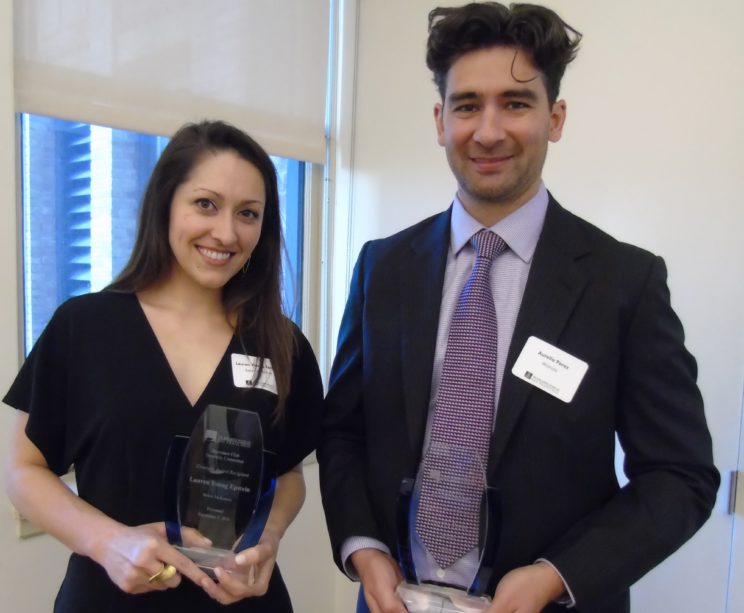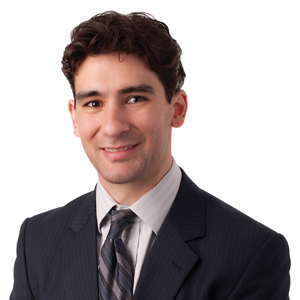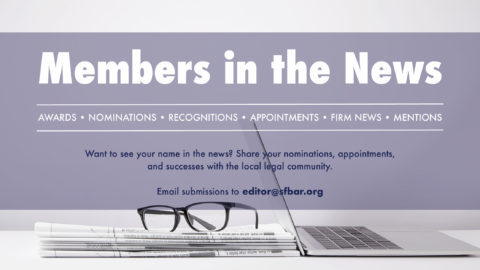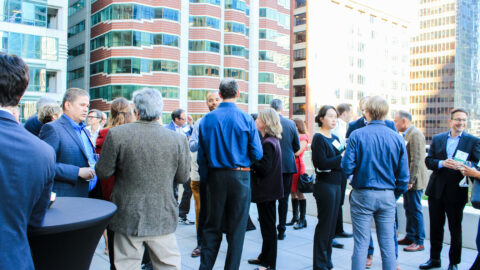More than 80 attorneys, judges, and law students gathered at Farella, Braun + Martel on September 5th for the Barristers Club’s 11th Annual Diversity Reception. The 2019 recipients were Lauren Young Epstein and Aurelio Perez. Perez was honored for his work as founder and organizer of the First Generation Professionals (“FGP”) Law Student Mock Interview Program while Young Epstein was recognized for her work as co-chair of the Minority Bar Association (“MBC”), secretary of the Women Lawyers of Alameda County, and as the MBC representative on the Barristers Board of Directors.
Lauren Marie Epstein

Lauren Marie Epstein realized at a young age that she was a little different than other kids. Although outwardly it was easy to mistake her for Caucasian, her family and home life were strongly influenced by her mother’s Chinese culture. Her extended family was almost all Chinese and her childhood outside of school was spent with her family and cousins around the same age. Back at school, not realizing her ethnicity, other children would tease or make fun of other Asian kids in her presence. Although she could have remained silent, she told the kids to knock it off and that she was Asian too. Instead of passively blending in, she learned at a young age to speak out when she was confronted with discrimination and injustice.
Lauren’s childhood experiences shaped the person and lawyer that she is today. Instead of standing by or passively observing injustice, she began working to create a more fair and equitable society for everyone. In high school, she began volunteering her time to help students with disabilities, including those in special education and with intellectual disabilities.
Lauren attended college at University of California, Santa Cruz, where she expanded her advocacy into racial and ethnic diversity and became active in Black and Latinx student organizations. Instead of attending the latest party, Lauren spent her free time tutoring and mentoring underserved primarily Latinx children in the community. In law school, Lauren continued her advocacy on behalf of diversity, equity, and inclusion, joining and becoming active in student organizations including APALSA, BALSA, and the International Law Students organization.
Lauren is now an associate in Baker McKenzie LLP’s Global Equity Services Practice Group in San Francisco, advising clients on equity-based compensation, tax obligations, securities law compliance and data privacy. Prior to joining her firm, she served for two years as a judicial law clerk for the Honorable Alan Jaroslovsky, Chief Judge of the Bankruptcy Court of the Northern District of California. While her practice has put time constraints on her advocacy, she has nevertheless found time to continue the work that has defined much of her young life. She is active in the firm’s diversity and inclusion efforts, including putting on events throughout the year focused on celebrating diversity and raising awareness.
Outside of the firm, she has served as a co-chair of the Minority Bar Coalition, secretary of the Women Lawyers of Alameda County and as a board member of the Barristers Club of the Bar Association. Although Lauren’s initial experiences with her own diversity weren’t always pleasant, she is grateful that her experiences gave her the strength to step up and join the fight towards a more fair and inclusive society.
Lauren Marie Epstein was interviewed by John Hamasaki, Barristers Club president.
Aurelio Perez
What does diversity mean to you, and how do you promote it?
It’s important for all of us to keep diversity top of mind. I do this in two ways. First, I acknowledge that many of the opportunities that have led to my success came through individuals and organizations that actively promote diversity in the legal profession. Second, I consciously look for opportunities to support and cultivate diversity. As lawyers we are called upon to provide legal guidance. But we are doing too little if we let what is legal and must be done distract us from what we believe is right and should be done. While we each can and should find our own route here, our profession should be diverse and, for the good of our society, must be diverse. I say this loudly and unapologetically.
Tell us about some of the ways you’ve been active and involved in promoting diversity in the profession?
I am involved with a number of organizations that are committed to fostering and maintaining the diversity of our profession. I have been a Board Member of the San Francisco La Raza Lawyers for a number of years; I was a founding member and, later, Chair of the California Minority Counsel Program’s Ambassador’s Council. Further, during the first 8 years of my career at Littler Mendelson, I was heavily involved in attorney recruiting and hiring efforts. I lead those same efforts now that I am Head of Legal at Wonolo.
I have also worked to increase the pipeline of diverse attorneys by helping diverse law students get jobs. About five years ago I learned that Berkeley Law had started a First Generation Professionals (“FGP”) student organization. The group, which recognizes common experience based on economic status and cuts across race and gender, helps individuals from non-privileged backgrounds gain the wisdom and develop the connections that will catalyze their success.
I was intrigued by the FGP group because my experiences in law school and seeking work as a legal professional were alienating. Besides the passing acquaintance with my professors, I didn’t know any lawyers and had never even been in a fancy business office, let alone a skyscraper. All those little things – from elevators with buttons on the outside to glass doors with inconspicuous keycard access – were unfamiliar to me. While I ultimately survived that gauntlet, I recognized that familiarity with these environments brings comfort and comfort breeds success. As I became an interviewer myself I repeatedly saw candidates whose discomfort made it harder for them to demonstrate their full potential. In order to address these issues, I founded and organized the FGP Law Student Mock Interview Program. Now in its fourth year, this program’s goal is to help more diverse students get the experience that they need to land the jobs that they want. The program accomplishes this through focused tough-love interviews and low-key networking with lawyers who are sincerely invested in the success of FGP students. It’s no accident that the program is always scheduled to coincide with the Bay Area Diversity Career Fair.
What’s driven you to be so focused and committed to promoting diversity in the profession?
There is this dream of the U.S. as the land of opportunities – a place where it doesn’t matter where you came from or what you came with. I lived this story. I was born in Nicaragua during the revolution. My family and I escaped when I was young by traveling through Central America and Mexico to the U.S. While I grew up poor, I grew up safe and I had opportunities. I worked hard and succeeded in no small part because others recognized and nurtured my potential. Now that I have come into my career, I must give back and do what I can to help others enjoy that same success.
Based on my own experiences, I wouldn’t call this a focus or commitment to diversity, but rather a desire for meritocracy that accounts for opportunity. A true meritocracy yields diversity. If the output of an allegedly ‘meritocratic’ system is not diverse, then the underlying metrics are skewed and you need a new framework to evaluate ability, contribution, and potential. Stated differently – I want to address situational inequalities and disparate opportunities in order to level the playing field.
Aurelio Perez was interviewed by Kelly Matayoshi, Barristers Club president- elect.





